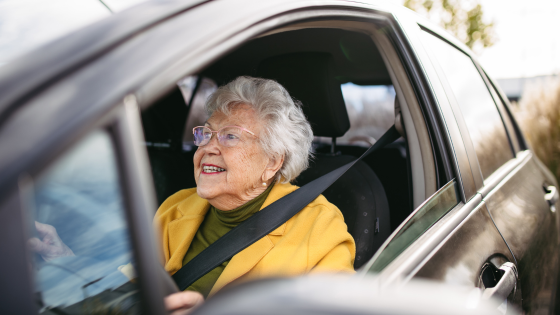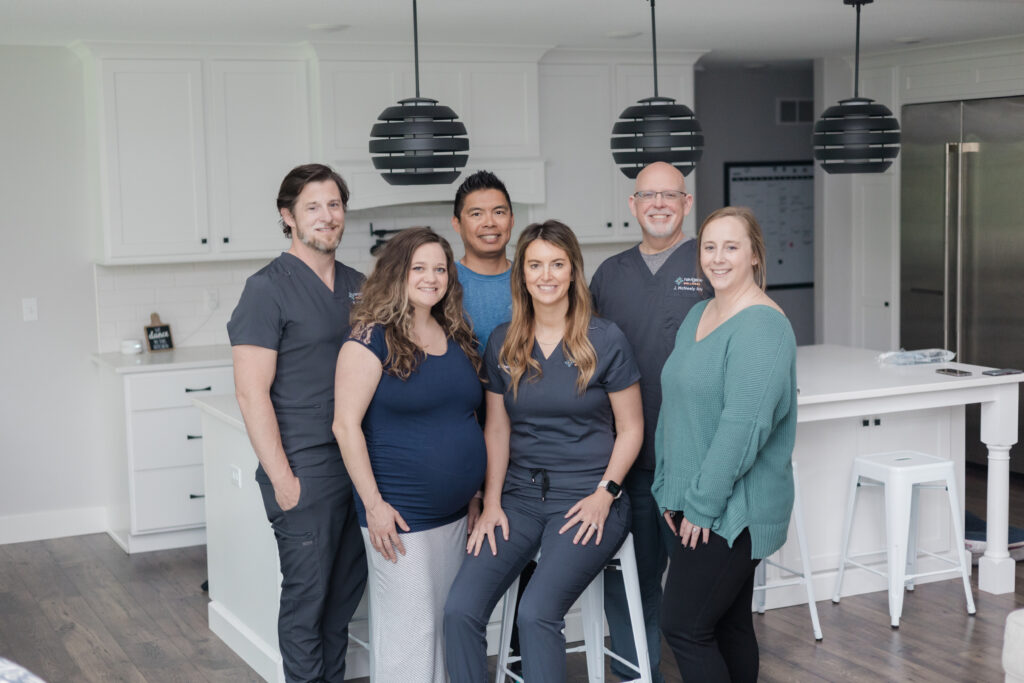There are many hard conversations when your parent or loved one has dementia. But one of the most difficult is around the topic of driving and dementia. Whether you’re trying to figure out how to convince an elderly parent to stop driving or just want tips to make this difficult conversation easier, this guide is for you.
“You mean I can’t drive, at all… no exceptions?” she said with equal parts disappointment and disgust after a long conversation pleading for the various scenarios in which she would have to drive.
“Correct,” I replied, wanting to say so much more than that – already having said so much more than that without much positive outcome.
Driving is a hot topic; a difficult topic. People flippantly say “they shouldn’t be driving” all the time, but when is it actually time to give up the keys? Better yet, when it is time to take the keys that aren’t willingly being given up?
When it comes to driving with dementia, there are providers who make it seem so simple, so clean. One day you are OK to drive, the next day you can’t. No more driving, at all, starting today.
There is often no plan offered, no guide, no script, no directions at all on how to now navigate your world without driving. This kind of coordination and continued conversations is put on adult children, spouses, and caregivers. These folks feel the same abrupt shock that an elderly driver does… “OK, Mom can’t drive. I guess that means I have to drive her? Everywhere?…”
So how do you discuss driving and dementia? And what can you do to navigate this difficult situation? Keep reading to learn from the first-hand experience of our Geriatric Care Navigator, Janie.

Discussing Driving and Dementia As a Geriatric Care Navigator
As a Geriatric Care Navigator who prides herself in protecting and celebrating the independence of our aging population – I really do not enjoy having conversations like this. I love finding a way to say yes. I love being creative and building a team that can help make sure what they want to do is what happens (if when it may be a little iffy to others). That sure is dreamy, isn’t it?
But when it comes to driving and dementia, there are times when I have to say no. No, you can not do that, this is a line we can not cross.
In this situation, I come alongside the client and their family. We have several conversations to make a thoughtful plan together that doesn’t involve one person suddenly giving up their life. We talk through places the client needs to be, we talk through what the adult child’s current availability is and what it can be, and we make a plan to fill the gaps, with the goal of both parties keeping their social, professional, and personal life as close to intact as possible.
What do you do when you don’t have a Geriatric Care Navigator to sit down and have these conversations with you and your aging parent? Check out some tips and local resources below to help you navigate this difficult transition.
How to Convince an Elderly Parent With Dementia to Stop Driving
When it’s time to discuss driving and dementia, it’s important to be prepared. For many adult children, this is one of the hardest conversations they’ll have with aging parents. And it’s just as difficult for the parent, too, who is likely worried about a loss of independence and a significant change to their life.
While these tips won’t make this conversation easy, it can help it go more smoothly while keeping your relationship intact.

Start With Open Communication
This is maybe the hardest part of the conversation about driving with dementia. Initiate an open honest conversation with your loved one about their driving habits, concerns, and the importance of road safety.
I know this can be hard to talk about – If you are nervous, I recommend using the words “I have something I want to talk about that is hard for me to bring up.” This sentence often breaks the tension a bit.
If there is a diagnosis of dementia, it is important to bring up that this diagnosis poses a serious risk that if in an accident, their care insurance will not cover damages and they will be fully financially liable.
I have used the example that driving with dementia is a lot like driving while impaired by alcohol. Much like people who have “only had a couple beers and feel fine to drive,” many people think in the early stages of dementia it is OK to drive because they don’t feel any different – but your ability to plan ahead, your reaction time, and your risk of being disoriented or easily distracted are already impaired.
Ask them if they have concerns and/or what they think about the new recommendation to not drive. Give plenty of time and space for this conversation – better yet, expect this to be much more than just one conversation. There will be long, silent pauses. Prepare yourself for these and allow them.
Observe Their Driving
Observation is something you can do if a provider has not yet given an official recommendation that they are not to drive but you’re concerned about driving and dementia.
Observe your loved one’s driving behavior firsthand to assess their ability to follow traffic rules, react to changing, and maintain focus while driving.
Use these observations to have the conversation about driving later – this helps keep the conversation less emotionally charged. “When I rode with you Sunday, I observed you got distracted by the radio and forgot where you were going.”
If you do not feel comfortable being in the car, offer to follow behind them. Alternatively, talk through if they have a friend who may be willing to drive with them and report back.
Schedule a Driving Evaluation
Arrange for professional driving evaluations to assess skills, reaction times, vision, and cognitive abilities behind the wheel. This can be with a local, private driving instructor or you can call your local Department of Motor Vehicles (DMV) to ask for a driving test.
For Columbia, MO senior driving information, visit Save MO Lives.

Continue Medical Check-Ups
Ensure regular medical check-ups to address age-related health issues that may impact driving abilities. Consider eyesight exams, cognitive exams and neurological disorders that impact feeling in extremities.
Ask your loved one if you can attend medical appointments and tell them honestly you’d like to talk to their provider about safe driving.
Explore Alternative Transportation
One of the biggest reasons the topic of driving and dementia is such a hard conversation is because the loss of driving feels like the loss of independence. By exploring solutions to this problem, you can help your loved one find ways to maintain their everyday lives as independently as possible.
Discuss and explore alternative transportation options like public transportation, ridesharing services, or community transportation programs. Don’t assume your loved one cannot (or will not) learn to use services like Uber or Lyft.
Consider if there is someone who can serve a dual role. Maybe a housekeeper who is also willing to take them to the grocery store or do a grocery run for them.
Remember that most aging adults still have a strong social support system. Do they have a friend that wants to drive them? Does the church have a volunteer list of people willing to offer rides? Is there something they can do for a friend (ie. cooking) that they could exchange for rides?
What Not To Do When Discussing Driving and Dementia
Just like there are best practices to use when talking to elderly parent about driving, there are also things to avoid.
Don’t Create Confrontation
Refrain from confrontational conversations about driving abilities as they may lead to resistance from senior family members. If you are the person who is most likely to argue with your aging parents, it is probably best to elect someone else to take the lead on this topic. If that is not an option, set firm boundaries that you will not talk about this unless everyone is calm (that includes you).
Do not use driving as a means of controlling your loved one. They either should be driving (maybe even with restrictions) or they should not be driving. Taking away driving because they have done something that does not please you or you do not agree with, is not OK.
If confrontation is inevitable (we get it, not all relationships are rainbows and sunshine), lean on professionals to guide the conversations, give recommendations, make plans, and set boundaries around driving. A therapist, doctor or elder care manager could all potentially help with this kind of conversation.
Don’t Ignore Warning Signs
Do not ignore warning signs such as near-misses, increased traffic violations, or physical limitations that may affect safe driving.
I often see people just avoid the conversation completely because they are worried about upsetting the person or they feel guilty bringing up an upsetting topic. I assure you – you will feel much worse, for much longer when an accident does occur because you did not act on your suspicions of unsafe driving.
Again – I can NOT recommend this enough, lean on professionals if you know you are not the right person to take the lead on this topic.
Avoid Assuming Dependence
Avoid assuming that giving up driving means loss of independence. Highlight alternative transportation options that can maintain freedom and mobility.
The biggest response I hear to no longer driving is “so I have to stay home all the time?” This does not have to be true. Come to the conversation with ideas on alternative ways to get places and expect to offer time to make lists of where they want to go. You may be surprised! Maybe they’ve always hated grocery shopping?
Don’t Delay Action
If there are clear signs of unsafe driving, do not delay taking action to address the situation and ensure safety on the road. It is not going to get better.
Most diagnoses and situations that require folks to discontinue driving are degenerative – that means they get worse, not better. And as we’ve discussed, discontinuing driving is not something that is usually agreed upon quickly. It takes time, conversations, and planning. Act and plan now.
Some of the best situations I’ve been involved in have even been proactive! The person doesn’t have any reason why they can’t drive, but the family talks about it now, and makes a plan on how to address it if and when it comes up. I recommend coming up with a simple driving contract that states measurable items that need to be present for driving to be safe. Review this annually or with any new diagnosis or situation.

Get Help Navigating Driving and Dementia
There are many ways you can get support when having this conversation with an aging parent or loved one. Here are some of our favorite resources:
State Department of Transportation
Contact your state’s Department of Transportation for resources on senior driving laws, licensing requirements, and safe driving tips.
In extreme cases, you can report someone to the DOT and they will receive a letter requiring them to test for a driver’s license. I don’t tend to recommend this route as it is sneaky and often causes mistrust and confrontation. However, this is real life and sometimes this is your only option, so you need to know it is one.
Insurance Providers
Consult insurance providers for information on senior driver discounts, safety courses, and resources for evaluating driving skills.
Some insurance companies provide safe driving monitors for cheaper premiums – think about how this could also be used as a way to objectively evaluate and obtain driving habits.
AAA Senior Driving
Explore AAA’s senior driving resources for educational materials, self-assessment tools, and programs tailored to senior drivers.
AARP Driver Safety Program
Consider enrolling in the AARP Driver Safety Program for older adults to enhance driving skills, stay updated on road safety, and receive insurance discounts.
Local Community Centers
Reach out to local community centers, health departments, or senior services for information on transportation assistance, driver refresher courses, and support networks for seniors.
The Columbia, MO Keep Your Keys Program, for example, is a resource that we often refer clients to in order to evaluate and support their continued driving goals.

How Navigate Wellness Can Help
If you’re local to Columbia, MO, and need help navigating driving and dementia, let Navigate Wellness help. We’re a team of Columbia Concierge Nurses and Senior Care Navigators committed to helping you and your loved ones age better.
Whether you need at-home concierge nursing care, want help coordinating inpatient care or want to learn how to age at home, we can help.
Contact Navigate Wellness to book a clarity call and explore your options.



